- AcademicsDegree TypeLocations
- Admissions
- Tuition & Aid
- Student Life
- About UNT
- Research
- Athletics
- Giving
Student Portraits Data Symposium
Student Portraits Data Symposium
Save the Date
2026 Student Portraits Data Symposium
Thursday, April 30 | 8 a.m. to 5 p.m.
UNT Gateway Center
Register now to save your spot!
Present at the 2026 Data Symposium
We are accepting proposals for the 2026 Student Portraits Data Symposium through Friday, Feb. 27. Read the Call for Proposals to learn more and apply.
Our 2026 theme, “Recognizing Every UNT Community Member as an Educator,” is inspired
by Look North: UNT 2030 and its vision that every interaction with a student has transformative potential.
UNT faculty, staff and students are invited to submit proposals for learning sessions
and poster presentations that showcase how they're leveraging data to shape meaningful
student experiences across our community.
2025 Student Portraits Data Symposium explored how data-informed discussions drive student success
May 15, 2025
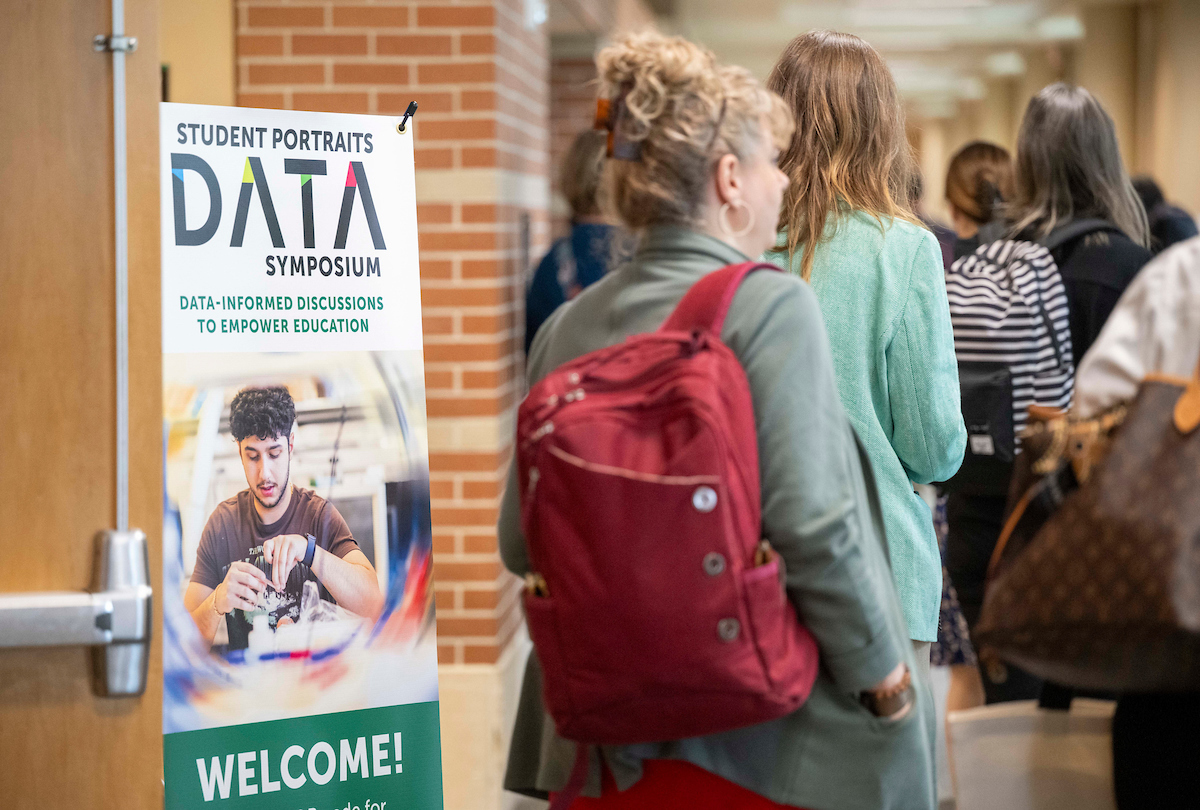
UNT’s student success mission took center stage at the 2025 Student Portraits Data Symposium with faculty, staff and students gathering to share insights and engage in enriching discussions about leveraging data and best practices to improve the student experience and institutional effectiveness.
Co-sponsored by UNT’s Accreditation, Student Success, and Data, Analytics, and Institutional Research offices, the symposium has a rich history of being a vibrant, robust and engaging community — a place to share successes and strategies, reduce data silos and cultivate new partnerships across UNT and beyond.
The 2025 symposium began with a keynote session facilitated by Randy Bass and Heidi Elmendorf of Georgetown University, followed by breakout sessions led by staff and faculty from UNT and Texas Woman’s University as well as three student groups who participated in UNT’s inaugural Student Assessment Challenge. Watch a video of the keynote session, Exploring Student Success at UNT.
For Christina Aguilar, director of student engagement and recruitment in the Ryan College of Business, the symposium was a reinvigorating end to a busy semester.
"We did some brainstorming in a couple of the sessions, and I'm leaving with a lot of great information and even some ideas I can take back to my office and implement immediately,” she said.
In the closing session, Vice Provost for Student Success Lisa McIntyre debuted the Dr. Jason Simon Data Champion Award, which recognizes an individual or team who promotes innovative use of data, a collaborative and caring approach and a passion for people and purpose. Jason Simon, the award’s namesake and inaugural winner, created the Student Portraits Data Symposium and will retire from UNT June 2 after nearly a decade of service as associate vice president for Data, Analytics, and Institutional Research.
Exploring Student Success at UNT
In the symposium’s keynote session, Exploring Student Success at UNT, Bass and Elmendorf shared a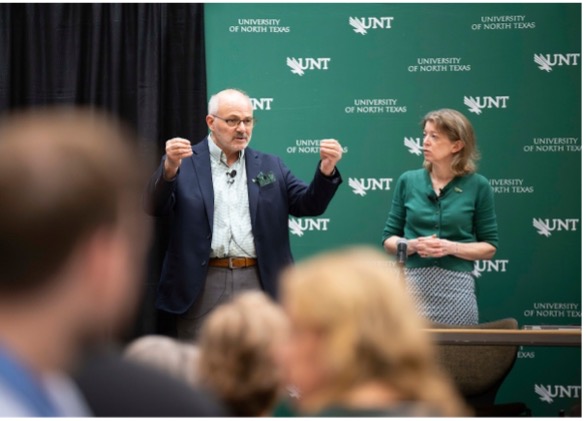 n overview of their research process, outlined their proposal for a new teaching and
learning ecosystem to drive student success at UNT, and led attendees in a design
exercise to connect their ongoing work to the broader UNT community.
n overview of their research process, outlined their proposal for a new teaching and
learning ecosystem to drive student success at UNT, and led attendees in a design
exercise to connect their ongoing work to the broader UNT community.
Bass and Elmendorf have served as senior advisors to President Keller since Fall 2024,
charged with developing a new approach to teaching and learning that will help realize
his mission to create transformative value for students and make UNT a national leader in access,
innovation, and excellence dedicated to advancing the public good.
Through quantitative data provided by units across the university and qualitative
data gathered through individual and group listening sessions, Bass and Elmendorf
have learned that UNT is a broadly accessible university with an authentic culture
of supporting student success, a deep well of faculty expertise, and an abundance
of local innovators. Many of the challenges they identified — including decreasing
college-readiness among incoming students and low retention rates — mirror trends
nationwide; however, UNT also faces financial constraints and knowledge silos that
make it difficult to grow its mission as a Tier One research university while providing
seamless, holistic student support.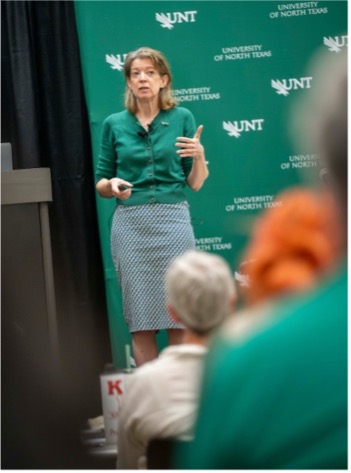 “All of the UNT work is happening within a national context in which there's a challenge
to the value of higher education that's perhaps greater than we've ever seen before,
and a real necessity for us to deliver on demonstrating the value of the higher ed
degree and return on investment,” Elmendorf said. “Part of that is going to be demonstrating
to students and the larger public the connectivity between the education and the career
outcomes that we seek.”
“All of the UNT work is happening within a national context in which there's a challenge
to the value of higher education that's perhaps greater than we've ever seen before,
and a real necessity for us to deliver on demonstrating the value of the higher ed
degree and return on investment,” Elmendorf said. “Part of that is going to be demonstrating
to students and the larger public the connectivity between the education and the career
outcomes that we seek.”
In Spring 2025, Bass and Elmendorf launched the design process to create a new ecosystem that places learning, teaching, and curricular alignment at the center of UNT’s student
success mission.
Their system proposes three independent, interlinked units that will serve the broader
UNT ecosystem:
- The Learning Initiative — a pioneering effort that advances innovative, research-based approaches to learning through collaboration, scholarship, and community engagement
- The Teaching Hub — a comprehensive center dedicated to advancing evidence-based teaching across the university
- The Curriculum Connector — a transformative initiative that aligns UNT’s curriculum with entry and exit points to drive student success from first contact through early career
Throughout the semester, faculty and staff members participated in four design charrettes to define each unit’s goals, functions, structure, and metrics of success, plan how
units will interact with each other, and explore how this work will be recognized
and incentivized.
“We didn't come bringing ideas,” Bass said. “We came believing that the ideas for
creating a new ecosystem were already here in the system, and our job was just to
facilitate a new way to see them.”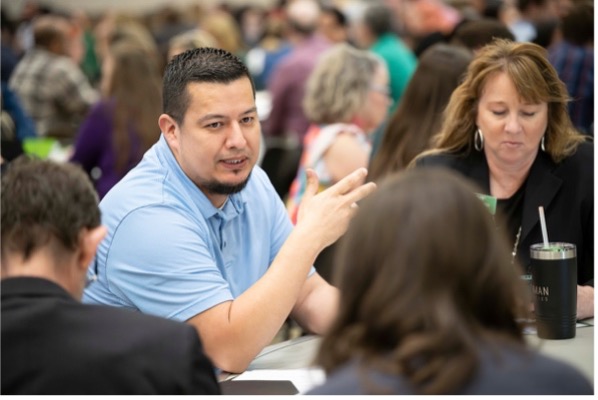 The symposium’s keynote session served as the fifth design charrette. Guided by questions
posed by Bass and Elmendorf, attendees discussed how their work can contribute to
and benefit from this new ecosystem, how the new ecosystem can foster partnerships
between faculty and staff, and how it can build stronger connections.
The symposium’s keynote session served as the fifth design charrette. Guided by questions
posed by Bass and Elmendorf, attendees discussed how their work can contribute to
and benefit from this new ecosystem, how the new ecosystem can foster partnerships
between faculty and staff, and how it can build stronger connections.
The launch phase has officially begun and will continue through the coming academic
year. The goal is to have all three units launched by Fall 2025, with substantive
pilot projects and working practices in place. Additional listening and response tours
will be scheduled to invite the broader UNT community to join in the work to come.
“None of this is a static goal,” Elmendorf said. “The external world, as we all know,
is changing faster than we can keep up with, so the institution itself needs to be
proactive and nimble in its ability to respond. Often, universities framed student
success as the mission of a particular office, and that simply can't be the case.
“Student success has to become part of everybody's mission and job portfolio.”
Watch a video of the keynote presentation and Q&A sessions:
Speaker Bios
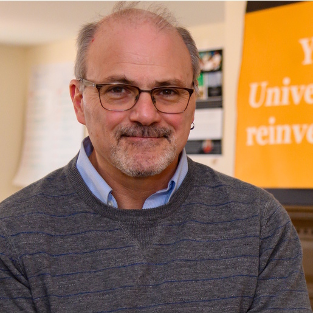
Randy Bass, Ph.D.
Randy Bass is vice president for strategic education initiatives, professor of English, and director of the Red House incubator for curricular transformation at Georgetown University. He served for 13 years as founding executive director of the Center for New Designs in Learning and Scholarship and seven years as vice provost for education. He has worked on educational innovation and the scholarship of teaching and learning for more than 30 years.

Heidi Elmendorf, Ph.D.
Heidi Elmendorf has been a faculty member in the Biology Department at Georgetown University for 26 years. As a scientific researcher, her passion is the diverse world of microbes. As an educator, she has designed a range of curricula and courses for undergraduate, high school, and carceral populations. More broadly her work has focused on creating partnerships and structures that support access to and investment in STEM education for all students.
Resources
Breakout Sessions
Unpacking TSI Incomplete Student Retention; Implications for UNT Support
Led by Sheila Bustillos, director of student services for assessment at UNT, this session explored mixed-methods data on Texas Success Initiative (TSI) readiness among incoming students across the Dallas–Fort Worth region. Special attention was given to first-generation and first-time-in-college (FTIC) students entering from high school with incomplete TSIA scores — a group shown to be particularly vulnerable to academic challenges and early attrition.
Retention data highlighted that students lacking full TSI completion are significantly more likely to struggle or drop out, making them a priority for targeted institutional support. Presenters called on the UNT community to focus efforts on this at-risk population with early, intentional interventions.
The session also integrated student wellness data, emphasizing the need to consider mental health and holistic wellbeing as part of the retention strategy. Through cross-departmental collaboration and problem-solving, participants developed ideas to strengthen academic and emotional support for these students. The takeaway was clear: improving outcomes for high school graduates requires a unified, comprehensive approach that bridges academics, wellness, and student engagement.
Presenters from the UNT Division of Student Affairs:
Dr. Sheila Bustillos, Director of Student Services Assessment
Sam Williamson, Assistant Director of Student Services Assessment
Shafayat Islam, Assistant Director of Student Services Assessment
Reporting by Cassandra Kutev
College of Science Student Success Intervention Initiatives
Since 2017, when UNT’s College of Arts and Sciences split into the College of Science and the College of Liberal Arts and Social Sciences, Dean John Quintanilla and his team have worked to ensure the college’s students succeed in class and graduate sooner.
His team, which includes fellow presenters Associate Dean of Undergraduate Students Lee Hughes and Senior Assistant Dean for Academic Affairs Tanisha Edwards, focused on three key reforms: reducing advanced course hour requirements for graduation, enforcing grade requirements to move on to higher level courses, and starting the first-grade campaign, wherein faculty members report each student’s first major grade in their course to academic affairs. Any student who earned a C, D, or F will receive a check-in message asking how their semester is going and providing links to resources such as tutoring labs.
“The end of the first semester is not the time to say, ‘Hey, here are these resources that could have helped you,’” Hughes said. “We want to get them that resource before the course ends.”
Presenters from the UNT College of Science:
Dr. John Quintanilla, Dean
Dr. Lee Hughes, Associate Professor and Associate Dean of Undergraduate Studies
Dr. Tanisha Edwards, Senior Assistant Dean for Academic Affairs
Reporting by Amanda Lyons
Team-Based Learning and Student Successes in the Music History Classroom
April Prince and Brian Anderson, lecturers in the UNT College of Music, employ team-based learning in their music history courses to foster active learning and student engagement.
“We primarily teach core curriculum, so we’re dealing with lots of big classes where you have to work really hard to create community,” Prince explained. “Team-based learning allows us to do that.”
Their hands-on session covered TBL fundamentals: preparation, readiness assurance, application exercises, and team evaluations. Participants practiced these strategies, including a group analysis of Journey’s classic hit, Don’t Stop Believin’.
“There’s a lot of data that really supports these learning methods, especially for undergraduates. It’s a different way of thinking and learning that encourages students to be active participants,” Prince said.
Presenters from the UNT College of Music:
Dr. April L. Prince, Principal Lecturer, Music History, Theory and Ethnomusicology
Dr. Brian Anderson, Senior Lecturer, Music History, Theory and Ethnomusicology
Reporting by Christiana Flores
Texas Woman’s University: Encoding Details from Program Assessment Reports for a Better
Big-Picture
Gray Scott, director of academic assessment and accreditation, and assistant director Mary Rosene discussed their ongoing efforts to make program assessment data more actionable and useful in TWU’s efforts to meet SACSCOC Standard 8.2.a, which emphasizes using assessment results to seek improvement in student learning outcomes.
Scott and Rosene inherited a labor-intensive manual process for gathering data, so their first move was transitioning to a more electronic and automated process. They then implemented a new coding model to simplify analysis and make it easier to identify the most desirable categories of actions for improvement (AFI).
For example, data interpreted using the new model showed that certain AFIs — such as changes to curriculum, pedagogy, resources, and processes — have a greater impact on student success than others. Armed with this information, departments can target their strategies to increase desirable categories.
A common assessment pitfall is the “department hero” — a faculty member who’s doing all the reporting and offering solutions that aren’t being uniformly implemented or tracked. To shift SACS reporting from a task to a shared mission, Scott and Rosene created an Assessment Fellows program, which has evolved into Assessment Pioneers — faculty who volunteer to learn more about best practices in program assessment and share that knowledge with their department colleagues.
Presenters from the Office of Academic Assessment and Accreditation at Texas Woman’s
University:
Dr. Gray Scott, Director of Academic Assessment and Accreditation
Mary Rosene, Assistant Director of Accreditation
Reporting by Amanda Fuller
Take Flight: Data-Driven Insights to FTIC Retention
Leveraging intentional interventions, the Take Flight Advising Team in the College of Liberal Arts and Social Sciences has seen a 10.2% increase in fall-to-fall registration for first-time-in-college students from 2024 to 2025. Students respond well to appointment requests and a communication campaign that targets common issues such as holds, next steps, grade checks, drops, and withdrawals. Navigate360 was a game-changer in terms of ability to pull reports, make decisions, and act appropriately for the intervention.
Using data from Insights 2.0, the team found that students who attended Freshman Orientation 10 or later were retained at lower rates, likely due to fewer classes being available and lower college-readiness. In response, CLASS instituted targeted interventions, and registration rates for this student population are currently ahead of where the full CLASS cohort were at this time last year.
“The data as it exists right now can be challenging to combine into a usable format and can be quite tedious,” said Katie Jenkins, assistant dean for student success in CLASS.
“That said, we have found that the benefits for student success far outweigh the efforts we have put into obtaining and utilizing the data. It helps us connect well with our students and give them what they need, when they need it, and in the format that meets them where they are.”
Presenters from the UNT College of Liberal Arts and Social Sciences:
Katherine Jenkins, Senior Assistant Dean for Academic Affairs
Justin Canfield, Senior Academic Counselor
Reporting by Kelley Pound
Student Assessment Challenge Showcase
Earlier this year, students participated in the inaugural Student Assessment Challenge calling on teams to analyze UNT’s data from the National Survey of Student Engagement, which was filled out by freshman and senior students in Spring 2024.
The showcase was an opportunity for winning teams to present their findings to a new audience and share how they sorted through the data, what challenges they faced, and what conclusions they found.
Educational psychology student An H. Dang’s presentation focused on when students felt regret about coming to UNT and classified which kinds of experiences influenced whether they felt regret. “Surprisingly, we found that students want to be academically challenged,” said Dang. “They want to hone their critical thinking skills.”
The second came from a team of five: Raahul Raj Akula, Akhil Katta, Sai Divya Konakanchi, Sarvamangala Sahiti, and Taruni Katta. This group looked at why students may feel stressed while at university. It found students more engaged in class and in extracurricular activities felt less stressed. Students with less support and heavy time commitments, like outside work and long commutes, felt more stressed.
Student Presenters: Kaitlyn Adamson, An Raahul Raj Akula, Sai Divya, Jai Sai Akhil Katta, Taruni Katta, Sarvamangala Sahithi Pulugurta, Machiraju, Dheeraj Marthand.
Reporting by Amanda Lyons
Ascend: Leveraging Student Voice to Enhance Classroom Engagement
Ascend is a data-informed development survey tool designed to help college instructors understand how students are experiencing their courses and identify effective teaching strategies that promote impartial social-emotional and academic success.
Feedback in learning conditions for categories such as belonging, growth mindset, self-efficacy, social connectedness and trust and fairness all culminate into overall identity safety for students in their learning environments.
Based on feedback given by students, educators are able to make adjustments that will enhance each student’s overall experience so they can be more confident in the areas connected to the learning condition categories.
“Ascend is a great tool because focuses on learning conditions and not satisfaction. Whereas the Student Perceptions of Teaching (SPOT) allows each student to give their perspective on how satisfied they are with the course and the course instruction, Ascend allows students to assess the learning conditions of their classes, which promotes equity and allows instructors to evaluate the extent to which students’ learning experiences are affirming,” says Stacey Polk, program manager in UNT’s Student Success office.
Presenter:
Stacey Polk, Student Success Program Manager
Reporting by Melisa Brown
Empowering Career Readiness Through Data Insights
When Eileen Buecher joined UNT as assistant vice president for the Career Center in 2022, it didn’t take long to see they had a data problem. Unclear methodologies and a lack of standardized processes made it difficult to leverage their extensive data on employer engagement and student outcomes.
In just three years, Buecher and her team have not only refined their data but also built a more efficient data infrastructure that fosters stronger employer partnerships and better serves students, faculty, and staff.
Senior Associate Director Melanie Mitchell led an eight-month project to revamp the career-readiness curriculum to meet students where they are in their academic journey.
Corey Davidson, assistant director for technology and experiential programs, shared how the center overhauled how they gather, organize, and use internship data by employing Handshake, the Internship Graduation Cord program, course rosters, the Career Center Internship Summit, and more.
Philip Aguinaga, assistant director for events and employer services, explained how the Employer Services Team uses data to track and improve employer engagement, from career fairs and industry days to targeted outreach to alumni employers.
Buecher closed the session with a list of the Career Center’s resources and services, including rich data sets on top employers by college major, employer engagement by industry, qualitative feedback from focus groups and surveys, and internship information.
“So, career coaches, faculty — If you have a question in your department about something, ask one of us!” Buecher said. “Any question you ask, someone else probably needs that same information.”
Presenters from the UNT Career Center:
Eileen Buecher, Assistant Vice President
Melanie Mitchell, Senior Associate Director
Corey Davidson, Assistant Director
Philip Aguinaga, Assistant Director
Reporting by Amanda Fuller